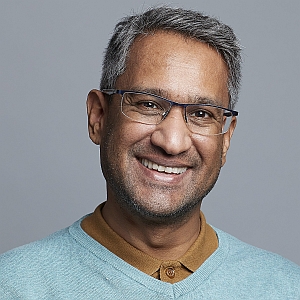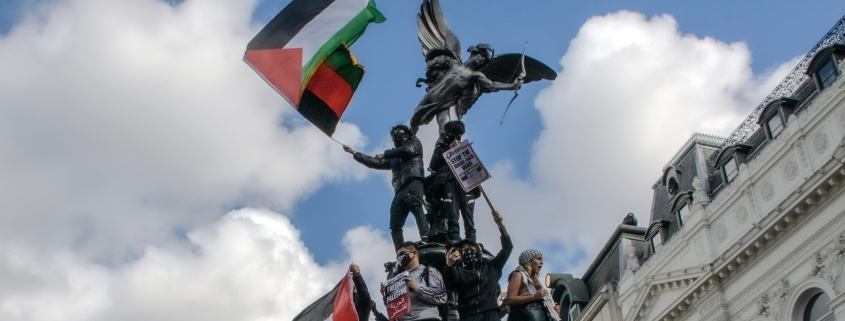Mainstreaming jihad
Prakash Shah argues that the left’s identification of revolutionary potential in Islamic fundamentalism is creating a paradigmatic shift in a public understanding in which Islamist fundamentalism, once associated with criminal violence, is now associated with ‘resistance’.

The demonstrations that sprang up in the United Kingdom immediately upon the gruesome atrocities of 7 October 2023 against Israelis and others – including Thai and Nepali, British and American people – are an announcement that a paradigm in attitudes toward jihadism has shifted. The past four weeks have seen the open proclamation of Islamic jihad on the United Kingdom’s streets and the intimidation of its Jewish population. These events have confirmed the comfort drawn by sections of the political left in the United Kingdom from the kind of revolutionary potential it detects in Islamic fundamentalism as the latter proclaims its jihad on the oppressors of Palestine. It is no longer unequivocally seen as a criminal movement, but one through which ‘resistance’ is being carried out. This description is seductive not only to Muslims but also sections of the left and supported by superficially attractive claims of decolonisation.
On issues such as LGBTQ+ rights, Islamic jihadism and leftist movements are diametrically opposed, but their soldering has occurred at the focal point of the Palestine question. Together, they have taken the genie of jihad out of the bottle. Not that this is the first time Muslims have run riot in the United Kingdom. The menace of Islamic fundamentalism and the criminality it espouses have not gone unnoticed since the burnings of Salman Rushdie’s The Satanic Verses in the late 1980s. Then, too, it was Iran that called for his execution. Even if the extent is difficult to verify, Iran today provides support and succour to Hamas. Although now a mere footnote in history, the Iranian revolution violently eliminated the left in that country.
It is just over a year since Hindus in Leicester and Birmingham saw close up that jihadis can operate almost without restriction with what appeared to be the collusion of the local police authority and municipality. Then the police stood by as Muslim males harassed Hindus, supressed their festivities, attacked their homes, and threatened their temples, leading to some leaving Leicester altogether. With a large spike in reported anti-Semitic incidents, British Jews are now considering their options. The spike in reported Islamophobic incidents curiously doesn’t lead to Muslims making emigration plans but is instead accompanied by calls to jihad from mosque pulpits in the United Kingdom.
If the number of those on the British security service watchlist was not already alarming, the scale of the jihadist problem has been shown in the demonstrations since the 7 October Hamas attacks. Groups of protestors have openly waved jihadist flags and shouted for the massacre of Jews. Although MI5’s director general confirms the current national threat level as being substantial, London’s police stood by. Adding insult, the police announced through their social media accounts that the flags and chants did not amount to criminal acts. They even produced the astonishing claim that according to their expert advisers no threat was posed, and the slogans were mere expressions of Muslim belief. If one treats the police claim generously one might be forgiven for concluding that the police too think that calling for jihad by Muslim armies is a legitimate expression of Islamic beliefs.
A 2018 report by the All-Party Parliamentary Group on British Muslims indicates how institutionalised the rot has become. It cites as an example of Islamophobia, ‘Denying Muslim populations the right to self-determination eg, by claiming that the existence of an independent Palestine or Kashmir is a terrorist endeavour.’ How then could Hamas possibly be a terrorist organisation? The report’s definition of Islamophobia has since been adopted by at least 66 mostly Labour-controlled local authorities in Britain, ignoring the government’s rejection of the APPG definition of Islamophobia.
As with Leicester last year and London this year, we might be forgiven for hypothesising that these movements have penetrated police forces. Similar police indulgence of Muslim attacks in London, accompanied by the waving of Pakistani and Turkish flags, has been shown during the several occasions when the Indian High Commission has been attacked. While successive home secretaries – then Priti Patel and now Suella Braverman – might outrage about such indulgence, operational matters lie with London’s mayor, Sadiq Khan, who has been in office throughout these events. In a seeming attempt to secure his return after the next mayoral election, Khan’s call for a ceasefire is an effective demand that the Israelis stop their pursuit of Hamas. He is not alone, with Scotland’s first minister, Humza Yousaf, and over 300 Muslim Labour councillors calling for the same approach. Some have resigned from the Labour Party.
Much of the culturally emasculated political right sees the explanation for both Leicester and the events in October 2023 in terms of a failure of multiculturalism. If multiculturalism entails a broad policy of tolerance of different cultures and creeds, Britain and its diverse society have largely lived up to the ideal. This includes those Muslims who differentiate themselves from the fundamentalist, self-appointed community leaders, but unfortunately not all do. It would be good to hear more, louder voices from Britain’s Muslim citizens condemning the pogrom of 7 October.
It is a pointless expectation for all immigrants to live up to the ideals of liberalism of which the political right has now become the defender. However, at least the varied segments of British society have not undermined the fabric of liberalism by open hostility to it. Again, it is those Muslims who identify more closely with Islamist beliefs, who also stand out as the most vociferously hostile to liberalism. This is not helped by non-Muslim British citizens who repeatedly concede to Islamist demands. We saw this clearly in Wakefield when the police and headteacher gave more weight to complaints of alleged desecration of the Koran than to death threats issued to an autistic schoolboy.
It is unfortunate that Braverman did not make this clear when she went on to blame recent immigrants, which can be read as referring to the Hindu victims, for last year’s events in Leicester. Immigration is often cited as a reason for the failure of multiculturalism. But that alone is insufficient. The Islamic fundamentalists who flout British laws and civility clearly rely on at least tacit support from a wider layer of Muslims. While this co-exists with Britain’s institutional hyper-sensitivity to preferred ‘victim groups’ – turbocharged by the rise of identity politics – the problem of greater social cohesion will remain unaddressed.
Some of the causes are to be found in Mark Curtis’s Secret Affairs, Britain’s Collusion with Radical Islam, where the author vividly describes the extent of the UK’s encouragement of Islamic fundamentalist movements. These jihadi chickens have now come home to roost, but you do not find those chiming into the chorus of international Islamism complain or resigning on those grounds. Years of intelligence gathering and academic research, hugely costly anti-radicalisation policies, and several laws on terrorism have strangely not controlled the problem. Largely dominant in all cultural institutions such as the media and universities, the collusive and deliberate blindness of the left has been noted already. Besides, this is not the old left, but a new social-justice left which turns blindness into an article of faith, debilitating Britain’s ability to respond to jihadism. This leaves Britain with no clear way out and a bleak future.
Dr Prakash Shah is a reader in Culture and Law at Queen Mary, University of London.
An earlier version of this article was published in The Print on 31 October 2023.


